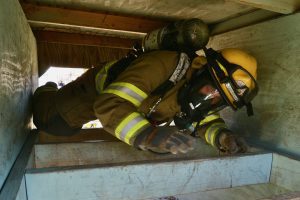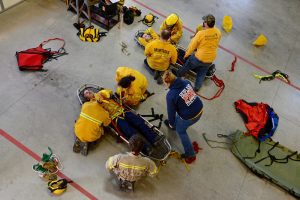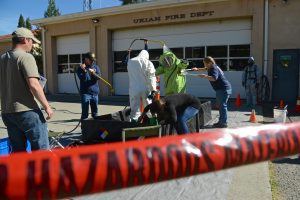 Mendocino College Fire Academy
Mendocino College Fire Academy
Nearly 320,000 acres burned throughout California last year, with more than 6,700 wildfires recorded across the state. Given the state’s vulnerability to these devastating fires, it may be surprising to learn that most fire responders work on a volunteer basis.
“Mendocino County is one of the largest counties in California, and also one of the least populated,” says Carl Magann, Fire Science instructor at Mendocino College and retired Fire Chief for the Little Lake Fire Protection District in Mendocino County. “Our county fire protection is provided by CalFire and twenty plus local fire departments, many of them strictly volunteer.”
Up until 2022, the Mendocino County Fire Chiefs hosted their own local volunteer firefighting academy, wherein local departments provided students with equipment, training facilities, and experienced instructors.
“The program provided students with an accelerated program with technical knowledge, and valuable hands-on experience and training,” notes Magann. “Unfortunately, with the increase of demands on all local fire agencies, the volunteer academy became less of a priority.”
With demand sizzling, Mendocino College decided to blaze a new trail. Starting in Spring 2024, the College’s first full-scale Fire Academy will begin fulfilling the critical need for firefighters. With help from Strong Workforce Program funding, in combination with support from the Mendocino County Fire Chiefs and CalFire, the College plans to provide students with a comprehensive and immersive experience in firefighter training.
“The students will come out of [the Academy] with everything they need in order to test for their Firefighter 1 certificate,” says Theresa Gowan, EMS and Fire Science Coordinator at Mendocino College. “They can [then] go work for any municipal department or they can go to work for CalFire.”
CalFire protects more than 31 million acres of wildland throughout 36 of California’s counties, making the force a prime employer for these firefighting grads.
“CalFire often depends on the initial training volunteer firefighters gain from their home departments to assist with their hiring of qualified seasonal firefighters,” says Magann. “CalFire provides many opportunities within our county and throughout the state for many potential firefighters and additional support employment.”

The establishment of the Academy is only the beginning, according to the Fire Science coordinator. Gowan says that the college hopes to combine forces with local fire departments to bring in volunteers and educate them to help better serve the region. This support would help bridge the gap in firefighter skillsets, covering aspects that, for the first time this year, weren’t taught at the local department’s fire academy.
“Every fire department except for one in Mendocino County is a volunteer fire department, so it’s huge for us to have that strong volunteer base and be able to get them what they need in order to move further in their career as a volunteer,” says Gowan.
Mendocino College Fire Academy do more than just learn the ropes… they get authentic experience translatable to real-world public safety careers. Strong Workforce-funded equipment covers the costs of running the Academy, along with paying the costs for students pursuing their certificate in the program.
In addition to “certificates that are obtained through the academy,” the College offers what Gowan calls “an advanced course for people who are looking to go into the company officer role” with a fire department. “We’re paying for those certificates also,” says the coordinator.
Students who complete the Academy are eligible to sit for capstone testing, which allows these future heroes to secure Firefighter 1 Certification through State Fire Training. With the certification under their belt, students are eligible to work in virtually any department in California.
“They get everything,” Gowan says about the updated Academy.
In past years, Mendocino College held smaller fire academies that didn’t offer as many certifications or qualifications at the time of completion. This time around, the Academy won’t be limited to working for CalFire or the Forestry Service as it had before. Instead, students will graduate with everything they need to work at essentially any department in the state. Students will complete their training in the Academy with certifications for both structure and wildland fires, along with hazardous material training.
The new Academy is helping students reach their goals, all the while offering a flexible fit for working adults. The training will take place throughout the Spring semester at 20 hours a week, with courses occurring on Friday evenings, Saturdays, and Sundays. The off-prime scheduling allows participants to continue working full-time while attending the Academy.
“Providing this training locally is a benefit to working individuals that lack the resources to travel and stay at other educational institutions providing this training,” explains Magann. “Hopefully, with this certificate of training, plus the hours of recognized training and expertise, students will have an easier time finding their employment opportunities.”
Magann himself understands the essential role of volunteer firefighters in a department. As a retired Fire Chief for the Little Lake Fire Protection District in Mendocino County and a certified instructor for State Fire Training, he’s also well-aware of the skills and dedication it takes to thrive in the profession.
 “Having local instructors, many of them active or retired firefighters, with an understanding of where our students are from and where and what they hope to achieve, should be of a benefit to students, regardless of their level of experience or skill set,” explains the retired Fire Chief. “Because of the way this academy will run and be maintained, students will gain the importance of timely scheduling, strength and aerobic conditioning.
“Having local instructors, many of them active or retired firefighters, with an understanding of where our students are from and where and what they hope to achieve, should be of a benefit to students, regardless of their level of experience or skill set,” explains the retired Fire Chief. “Because of the way this academy will run and be maintained, students will gain the importance of timely scheduling, strength and aerobic conditioning.
“In many ways, it is similar to basic bootcamp.”
With the addition of the Company Officer Series, students can garner leadership skills to bring back to local departments to manage volunteer systems in their communities. Graduates of the program earn the first certification in the California Officer Professional Certification series, a required step for those looking to lead a crew of firefighters.
Meanwhile, the College is seeking accreditation for 2025 to allow students to complete Capstone Testing at the college. Gowan says this is key to keeping their workers in local departments and further supporting the surrounding communities.
“My big thing is, keep our [students] local,” concludes the coordinator.
Magann agrees: “I do believe that the 2024 Academy will be successful and will lead to another avenue for our local students and population to ready themselves as potential career employees.”
Sources:
https://www.fire.ca.gov/incidents/2023
November 2023